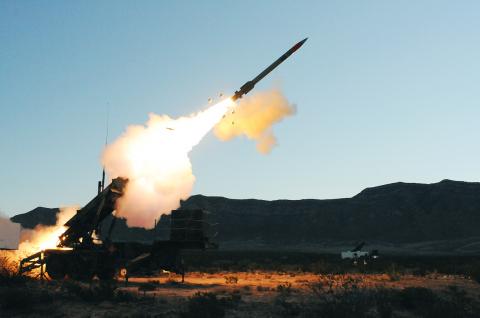After years of planning, work will officially begin early next month at sites around Greater Taichung and Greater Kaohsiung in preparation for the deployment of Patriot Advanced Capability-3 (PAC-3) air defense units purchased from the US, senior officials said yesterday.
In all, NT$61.4 million (US$2 million) has been set aside from next year’s budget to prepare the sites for four PAC-3 units in the two special municipalities. A private contractor will oversee work at the sites, a Ministry of National Defense spokesman said, declined to provide further information on the engineering contract, citing Government Procurement Act (政府採購法) regulations.
Taiwan currently deploys three PAC-2 units, which were recently upgraded to PAC-3 configuration, around Taipei in Wanli (萬里), Nangang (南港) and Sindian (新店). During negotiations under Chen Shui-bian’s (陳水扁) administration, it was decided that Taichung and Kaohsiung would both get Patriot units to protect the political and military centers, as well as critical infrastructure in central and southern parts of the country.

Photo courtesy of Lockheed Martin Corp
The ministry has reportedly mapped out a number of locations for the deployment of the PAC-3 units, including Greater Taichung’s Dadu Mountain (大肚山), Greater Kaohsiung’s Jenwu District (仁武), Greater Tainan’s Hutoupi (虎頭埤), as well as the Pingtung and Chiayi airports.
A military official would not confirm the sites chosen for the four units, which were included in the US$6.4 billion arms package notified to US Congress in October 2008 and are scheduled for delivery in 2014 or 2015. Two more units were part of a subsequent package announced in January 2010 and will be introduced as part of a future phase.
Raytheon Corp is the manufacturer of the fire units and radars, with Lockheed Martin Co producing the hit-to-kill missiles.
Taiwan has so far purchased a total of 388 PAC-3 missiles as part of the multibillion-dollar procurement deals. To increase the chances of intercept, PAC-3 doctrine calls for the use of two missiles per incoming target, a method known as “ripple firing.”
Although critics of the PAC-3 argue that the air defense system could easily be overwhelmed by a large number of Chinese ballistic missiles fired simultaneously or in close sequence, proponents of the system counter that from the beginning, the program was meant to deny Beijing the ability to engage in coercion by threatening limited missile attacks against key infrastructure to intimidate decisionmakers in Taipei.

CHAOS: Iranians took to the streets playing celebratory music after reports of Khamenei’s death on Saturday, while mourners also gathered in Tehran yesterday Iranian Supreme Leader Ayatollah Ali Khamenei was killed in a major attack on Iran launched by Israel and the US, throwing the future of the Islamic republic into doubt and raising the risk of regional instability. Iranian state television and the state-run IRNA news agency announced the 86-year-old’s death early yesterday. US President Donald Trump said it gave Iranians their “greatest chance” to “take back” their country. The announcements came after a joint US and Israeli aerial bombardment that targeted Iranian military and governmental sites. Trump said the “heavy and pinpoint bombing” would continue through the week or as long

TRUST: The KMT said it respected the US’ timing and considerations, and hoped it would continue to honor its commitments to helping Taiwan bolster its defenses and deterrence US President Donald Trump is delaying a multibillion-dollar arms sale to Taiwan to ensure his visit to Beijing is successful, a New York Times report said. The weapons sales package has stalled in the US Department of State, the report said, citing US officials it did not identify. The White House has told agencies not to push forward ahead of Trump’s meeting with Chinese President Xi Jinping (習近平), it said. The two last month held a phone call to discuss trade and geopolitical flashpoints ahead of the summit. Xi raised the Taiwan issue and urged the US to handle arms sales to

State-run CPC Corp, Taiwan (CPC, 台灣中油) yesterday said that it had confirmed on Saturday night with its liquefied natural gas (LNG) and crude oil suppliers that shipments are proceeding as scheduled and that domestic supplies remain unaffected. The CPC yesterday announced the gasoline and diesel prices will rise by NT$0.2 and NT$0.4 per liter, respectively, starting Monday, citing Middle East tensions and blizzards in the eastern United States. CPC also iterated it has been reducing the proportion of crude oil imports from the Middle East and diversifying its supply sources in the past few years in response to geopolitical risks, expanding

Pro-democracy media tycoon Jimmy Lai’s (黎智英) fraud conviction and prison sentence were yesterday overturned by a Hong Kong court, in a surprise legal decision that comes soon after Lai was jailed for 20 years on a separate national security charge. Judges Jeremy Poon (潘兆初), Anthea Pang (彭寶琴) and Derek Pang (彭偉昌) said in the judgement that they allowed the appeal from Lai, and another defendant in the case, to proceed, as a lower court judge had “erred.” “The Court of Appeal gave them leave to appeal against their conviction, allowed their appeals, quashed the convictions and set aside the sentences,” the judges